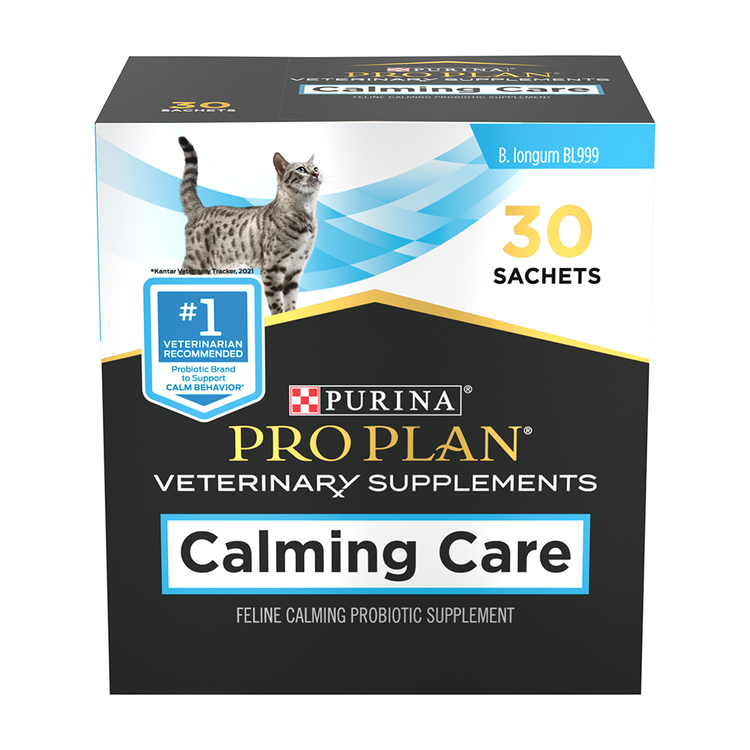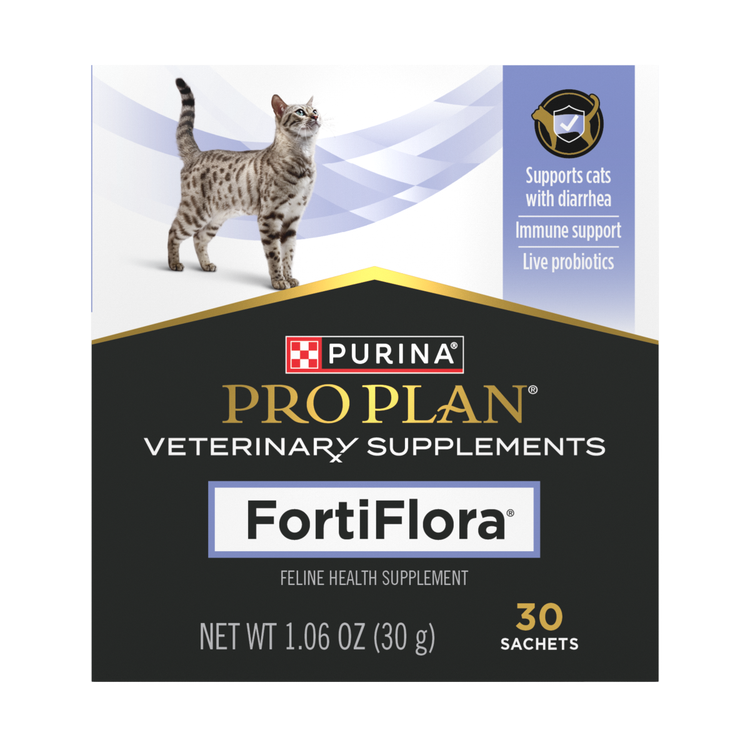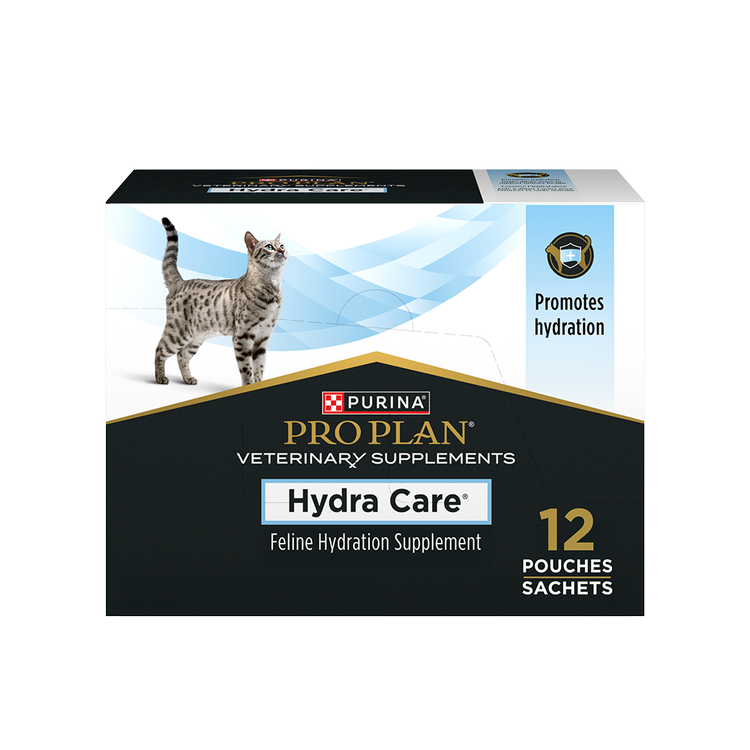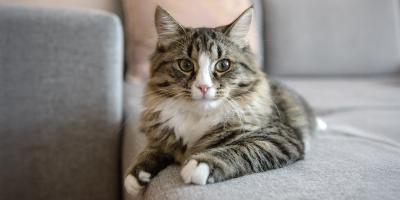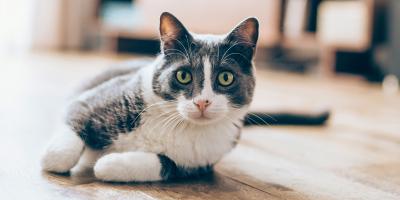Cat Vitamins & Supplements: What Do Cats Need?


When you feed your cat a high-quality commercial cat food, like those from Purina, your cat’s diet is nutritionally complete and balanced, and additional vitamin and mineral supplements are not necessary. However, cat supplements may be of benefit in managing certain health conditions. It’s important to talk to your veterinarian, who can help you decide the best food or supplement for your cat’s specific health concerns.
What Are Nutritional Supplements for Cats?
Nutritional supplements for cats may contain vitamins, minerals, and other nutrients that are blended in the proper proportion to support a unique health need. The nutritional needs for cats are met with a healthful cat food that is complete and balanced because essential vitamins and minerals are added to the food.
If your cat has a specific nutritional need – such as hairball control, weight management, urinary tract health, or sensitive skin – talk to your vet about commercially available cat food, or veterinary formulas, that have been created with the cat vitamins, minerals, and nutrients that will help you and your vet manage your cat’s condition.
Cat food supplements come in a variety of forms, including powders, crunchy textures, and liquids. In addition to active ingredients, they may also contain inactive ingredients that are included to improve the taste or maintain the supplement’s form.
What are the among between vitamins, minerals, and supplements? Individual vitamins and minerals are a single source of a nutrient. Multivitamin/multimineral supplement formulas commonly contain multiple vitamins, dietary minerals, and other nutrients in dosages that are recommended based on a minimum daily requirement.
| Vitamins/Minerals | Supplements | Both |
|---|---|---|
| Individual vitamins and minerals are a nutrient from a single source | Supplements contain a mix of vitamins, minerals, and other nutrients | Both are available in a variety of forms, such as tablets, powders, and liquids |
| Vitamins and minerals are included among the active ingredients in supplements | The active ingredients in supplements are blended to support a unique health need | Both must pass efficacy and quality control standards, such as the NASC |
While humans and cats may share a need for certain similar vitamins, the dosage will most likely not be the same. Do not give your cat vitamins and minerals or supplements made for human consumption unless instructed by your veterinarian. Large doses of vitamins, like A or D, can be toxic to your cat.
What Vitamins and Mineral Supplements Do Cats Need?
If they are being fed a nutritionally complete and balanced diet, extra vitamins or mineral supplements are usually not necessary.
If you are feeding your cat a homemade cooked or raw diet, you may need to supplement with vitamins and minerals. Check with your vet or a Board-Certified Veterinary Nutritionist to ensure your cat is getting all the nutrients they need for a healthy life.
Cats are obligate carnivores and that means they require certain animal-based nutrients in a diet that’s balanced in the proper proportion to carbohydrates and fats.
Cats need dietary taurine in their diet to maintain their eye, reproduction, and heart health. Dietary taurine is found in animal-based sources, such as muscle meats, and is also supplemented in high-quality commercial cat food diets.
Although all commercially prepared cat food must meet the standards set by the Association of American Feed Control Officials (AAFCO) for the life stage of the cat, not all cat foods are created the same. Learn what makes a healthy cat food and how you can be assured you are purchasing the best food for your cat.
Key components of the AAFCO standards include:
- Protein: as obligate carnivores, cats need protein to develop healthy bodies as kittens and to maintain healthy bodily functions as adults.
- Dietary fats: healthy animal fats are necessary for cats to absorb essential vitamins.
- Omega fatty acids: omega-6 fatty acids are essential in cats of all ages for skin and coat health. Omega-3 fatty acids are required for brain development in growing cats. Cat foods often include fat sources from animals, such as fish oil, to provide some of these fatty acids.
- Vitamins and minerals: these contribute to a complete and balanced diet, strong immune system, and healthy skin & coat. Examples include:
- Vitamin A for cat’s night vision, immune system, and healthy skin
- B vitamins for cats as an essential component for normal metabolism
- Vitamin D for cats to build strong bones and teeth
- Zinc for a cat’s skin and wound healing, immune system, and growth
In addition to 100% complete and balanced dry food, your cat may also enjoy canned cat food. Wet food can help your cat consume enough moisture to meet their daily water needs. Keep fresh water available, because even those cats that like to get their moisture from wet food will occasionally have a need for fresh water.
What Supplements Should You Give Your Cat?
A common question among cat owners is, What supplements should I give my cat? If your cat has a specific nutritional need, talk to your vet about cat foods that can address those conditions. Purina brands offer an extensive range of cat foods in a variety of formulas and flavors. These nutritionally complete wet and dry cat foods have different formulations that address several health issues, such as:
- Allergen Management
- Cognitive Health Support
- Dental Care/Health
- Digestive Support
- Food Allergies
- Hairball Control
- Immune Support
- Joint Health
- Kidney Function
- Sensitive System
- Skin & Coat
- Urinary Tract Health
- Weight Management
If your cat has a serious health concern, talk to your vet about veterinary formulas that may benefit your cat’s unique condition.
Types of Supplements for Cats
Purina supplements for cats may support certain health conditions and can be part of a cat’s preventative health routine. Some of our supplements are available wherever pet food is sold or can be purchased online from our website. Others are sold only through veterinarians or require a prescription from your vet.
Cat Calming Supplements
Calming supplements may help cats that display anxious behaviors, such as:
- Pacing, obsessive behavior, or aggression towards other pets
- Nonsocial behaviors – not wanting to play or not seeking affection
- Nervousness from changes in their routine or location
Purina Pro Plan Calming Care Veterinary Supplement contains BL999, a strain of probiotics that has been shown to help cats maintain a calm behavior. Calming Care helps blunt cortisol, a marker of stress, and supports immune health. It can also help reduce sneezing associated with the feline herpes virus (FHV-1). Sprinkle on top of food.
Cat Digestive Supplements
Probiotic supplements for cats may offer support if your cat shows signs of digestive issues, including:
- Diarrhea
- Imbalance of the intestinal microbiome
- Immune system issues
- Post-antibiotic digestive trouble
Purina Pro Plan FortiFlora Veterinary Supplement for cats contains probiotics proven to promote intestinal health and microbiome balance. Pet parents and vets indicate it works as an appetite enhancer for finicky cats or those that refuse to eat. Sprinkle on top or mix in with canned food.
Purina Beyond Mixers for Digestive Support contain natural prebiotic fiber from flaxseed and chia seeds to feed the beneficial bacteria in your cat’s gut, helping to balance your cat’s natural digestive microbiome.
Hydration Supplements for Cats
Supplements that help enhance the hydration status of cats can be beneficial in conditions such as:
- Constipation
- Kidney disease
- Urinary disease
- Diabetes mellitus
When cats have these conditions, ensuring they consume enough water can be a challenge.
When cats have certain conditions, such as kidney disease, diabetes, or diarrhea, ensuring they consume enough water can be a challenge. These cats can be prone to dehydration. Talk to your vet about Purina Pro Plan Hydra Care Veterinary Supplement. It helps cats increase their total liquid intake and maintain a healthy level of hydration.
Immune Support for Cats
Purina Beyond Mixers for Immune Support are rich in protein and contain vitamins A and E to support your cat’s immune health. They are available without a prescription and in multiple flavors.
Cat Dental Supplements
Purina DentaLife Advanced Care Cat Treats are crunchy treats with a porous texture that help reduce tartar buildup on your cat’s teeth. Available in different flavors, the formulas also include probiotics for a healthy digestive system, calcium, taurine, and other nutrients to support immune health.
There are many good supplements for cats available in the market, but it’s crucial to consult with a veterinarian before giving any supplements to ensure they are safe and appropriate for your cat’s individual needs. If your cat is struggling with any of these issues, your veterinarian should be the one to assess whether supplementation is an appropriate choice, or if other options would be more beneficial.
For more expert tips for the health of your cat, explore our other cat health articles.

Find Your Pet’s Perfect Food
Use our Pet Food Finder to get a custom recommendation from Purina Nutritionists.

